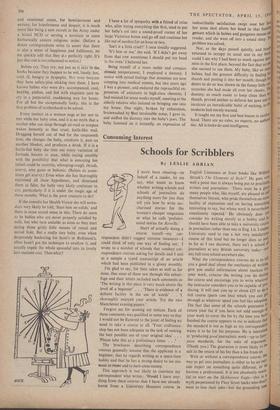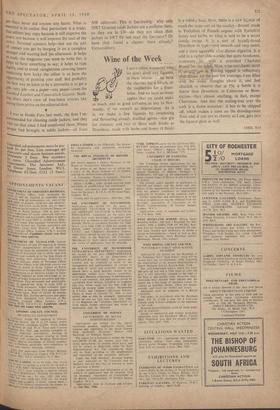Consuming Interest
Schools for Scribblers
By LESLIE ADRIAN I HAVE been cheating—on behalf of a reader, let me say, who wants to know whether writing schools and schools of journalism do anything more for you than tell you how lo write sac- charined stories for the women's cheaper magazines or what he calls 'prefabri- cated stories for Reveille.'
Short of actually doing a course myself—my cor- respondent didn't suggest extreme measures—I could think of only one way of finding out : I wrote to a number of schools that conduct cor- respondence courses asking for details and 1 sent as a sample a typed manuscript of an article which had been published in a glossy monthly.
I'm glad to say, for their sakes as well as for mine, that most of them saw through this subter- fuge and their letters included such comments as 'The writing in this piece is very much above the level of a beginner' . . . 'There is evidence of a definite facility in the use of words' . . . 'I thoroughly enjoyed your article. Try the two Manchester evening papers.'
Forgive me for quoting my notices. Each of these comments was qualified in some way so that I would not be flattered to the point of feeling no need to take a course at all. 'Your craftsman- ship has not been adequate to the task of making the best possible use of your original idea' . • . 'Please take this as a preliminary letter. . .
The brochures describing correspondence courses generally assume that the applicant is a beginner, that he regards writing as a spare-time hobby and that he has a strong desire to see HIS NAME IN PRINT and to earn some money.
This approach is not likely to convince my correspondent who writes : 'Would I learn any- thing from these courses that I have not already learnt from a University Honours course in English Literature or from books like Williarn Strunk's The Elements of Style?' He puts veri well a point that is always being put to practising writers and journalists : 'There must be a gre'lfi many people who, like myself, are pleased to cal themselves literate, who pride themselves on so° facility of expression and on having somethieg interesting to say, but whose work is nevertheles5 consistently rejected.' He obviously does ne4 consider his writing merely as a hobby and should have been able to take a university course in journalism rather than one in Eng. Lit. London University used to run a not very satisfactorY course of this kind but no longer does so and so far as I can discover, there isn't a school 00 journalism at any British university today-0°f any full-time school anywhere else.
ll
What the correspondence courses do is tote – you a good deal about the mechanics of writing' give you useful information about markets Or your work, criticise the writing you do &ring the course and encourage you to write whatever • the instructor considers you to be capable of Pr°. ducing. It will cost you up to about £25 to do a full course (parts cost less) which you can get through at whatever speed you feel like adopting' The fact that some of the schools guarantee i(if return your fee if you have not sold enough ° your work to cover the fee by the time you hay! finished the course appears to me to indicate tha' the standard is not as high as my correspondent, wants it to be for his purposes. He is interesten in 'producing good journalistic work—up to SPet; tator standards, for the sake of argument' (Thank you.) The guarantee is more likely to re' suit in the return of his fee than a fee from us. With or without a correspondence course; tile way to get into journalism is either to be an 00 side expert on something quite different, or NI become a professional. It is not absolutely esseit' tial to start on the Skibbereen Eagle—this Is 1,4 myth perpetuated by Fleet Street hacks who don t want to lose their jobs—but the grounding Y0It get there never did anyone any harm. What Ls tssential is to realise that journalism is a trade; that editors buy copy because it will improve the Paper. not because it will improve the soul of the writer. Personal contacts help-but not the sort of contact you get by barging in on a complete stranger and wasting half his afternoon. It helps to study the magazine you want to write for; it helps to have something to say; it helps to type legibly and to avoid vainglorious covering letters explaining how lucky the editor is to have the oPPortunity of printing your stuff. But probably the best way to learn to be a journalist is to get a .!°b-any job-on a paper-any paper-even the oothed Leather and Cross-stitch Gazelle. Noth- ing alters one's view of free-lance articles like seeing them arrive on the editorial desk.
I was in Noble Furs last week, the firm 1 re- -commended for cleaning suede jackets, and they l°1(1 me that since I had mentioned them, fifteen Pe°Ple had brought in suede jackets-all from NW addresses.' This is fascinating:- why only NW? Granted suede jackets are a uniform there, so they are in SW-do they not clean their jackets in SW? Or not read the Spectator? Or have they found a cleaner there already? Extraordinary.



































 Previous page
Previous page